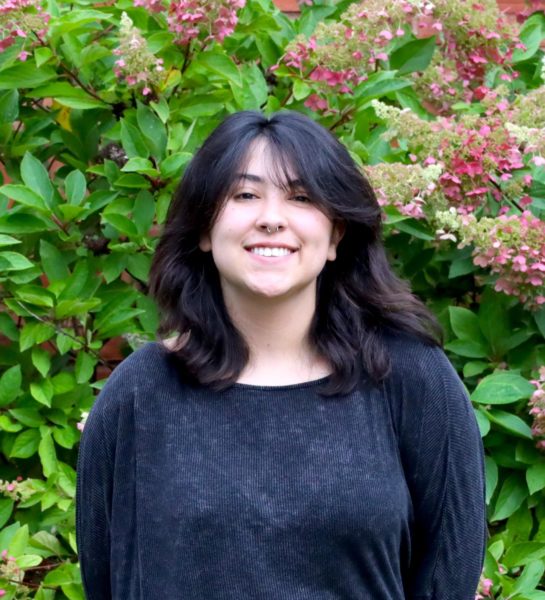Rejecting death of the author: Why “Percy Jackson” succeeds over “Harry Potter”
Known for the diversity of his characters, Rick Riordan did not disappoint with the new trio for his Percy Jackson TV series. From left to right: Annabeth Chase (Leah Jeffries), Percy Jackson (Walker Scobell) and Grover Underwood (Aryan Simhadri)
September 23, 2022
In terms of commercial success, there is no comparison between the “Harry Potter” and “Percy Jackson” franchises. I easily concede that J.K. Rowling’s “Harry Potter” franchise is a financial juggernaut. Rowling has sold approximately 500 million copies of her series, whereas Rick Riordan, the author of the “Percy Jackson & the Olympians” (PJO) series, has only sold 180 million copies thus far. This gross is not even counting the momentous earnings from the “Harry Potter” movies and theme parks. Despite this, the “Percy Jackson” franchise is leagues ahead of “Harry Potter” for a multitude of reasons.
With the release of the trailer for Disney+’s upcoming PJO show, I am reminded of why Riordan’s children’s literature franchise is the better of the two. While I do enjoy the actual writing of Riordan’s works more, the success of his works lies in his commitment to representing diversity. The displays of inclusivity are important when considering an author’s body of work, especially when discussing books targeted toward adolescents.
Death of the author, conceptualized by French theorist Roland Barthes, is traditionally concerned with how people read and understand the meaning of a certain text. To sum it up, Barthes’ philosophy states that the intentions and background of the person who wrote a text are ultimately meaningless. The significance of a literary text should be imbued by the reader; the reader’s interpretation reigns supreme. Outside of academia, this concept’s meaning has morphed to include the debate of whether the author’s actions and words outside of the explicit text should influence people’s support of the work as a whole.
Rowling’s recent transphobic tweets have generated a good amount of controversy, causing some fans to go as far as to boycott the series. In contrast, other fans argue the “death of the author” line of reasoning. One example of these tweets is when Rowling wrote, “People who menstruate. I’m sure there used to be a word for those people. Someone help me out. Wumben? Wimpund? Woomud?” in response to an opinion piece titled “Creating a more equal post-COVID-19 world for people who menstruate.” Now, I’m not arguing that die-hard fans of “Harry Potter” are morally obligated to boycott the franchise. Rather, the author’s actions should impact outward support of their works—especially when they are currently alive and being rewarded monetarily from said support.
The “Harry Potter” series may not be directly related to Rowling’s numerous transphobic spoutings on Twitter, but with this new look at Rowling’s character, the books should be reevaluated with a new lens. The goblins, who act as bankers, feature many anti-Semetic stereotypes. There aren’t many people of color (POC) characters in the franchise, and those who are there also suffer from a chronic lack of forethought on the author’s part—Cho Chang herself has a name consisting of two stereotypical surnames. Additionally, some fans take issue with the author making some of the Death Eaters—which resemble Nazi ideology—sympathetic. The books, which are rife with stereotypes and poorly executed POC characters, are aimed at young readers, who are not equipped with critical thinking for complex media literacy.
On the other hand, Riordan began his book series intending to make kids with ADHD and dyslexia feel more normalized. Though Riordan started with this commendable goal, his earliest set of books, PJO, lacks any other diversity. In Riordan’s “Heroes of Olympus” series, the sequel series to PJO, he aimed to correct this mistake and added diversity to the characters’ main cast.
Riordan, understanding the importance of children seeing themselves represented, committed to race-blind casting in the new PJO Disney+ series, allowing casting of anyone who was best for the role. He stated his full commitment to Disney’s company policy of inclusivity, saying, “We are committed to diverse, inclusive casting. For every role, please submit qualified performers, without regard to disability, gender, race and ethnicity, age, color, national origin, sexual orientation, gender identity or any other basis prohibited by law.”
After being cast as Annabeth, Leah Jeffries was bombarded with hate because she is Black. In response to this, Riordan leapt to her defense and spoke against fans of the series who were upset with the decision. Riordan wrote, “The core message of Percy Jackson has always been that difference is strength. There is power in plurality… You should never judge someone by how well they fit your preconceived notions… If you don’t get that, if you’re still upset about the casting of this marvelous trio, then it doesn’t matter how many times you have read the books. You didn’t learn anything from them.” This type of uproar is not new. Following Disney’s live-action “The Little Mermaid” trailer, many on the internet were up in arms about Halle Bailey portraying Ariel.
Riordan is also able to use his platform to prop up other authors through “Riordan Presents.” The explicit goal of this enterprise is to “publish great middle grade authors from underrepresented cultures and backgrounds, to let them tell their own stories inspired by the mythology and folklore of their own heritage.” While Riordan’s writing is not without its pitfalls, his choice to use his influence to support underrepresented voices is one we don’t often witness in publishing.
When writing for children’s literature, an author’s actions are important to consider. Riordan succeeds not because of monetary gains or his superior writing, but because his franchise encapsulates what the focus of children’s literature should be. If you are recommending one of these two highly popularized and successful franchises for children to read, it probably should not be the one that tacitly agrees to objectionable stereotypes and relegates diversity to the sidelines. Supporting the PJO show indirectly endorses the message that Riordan is attempting to push by enforcing an open-casting call. When the series releases in 2024, I hope you tune in.




